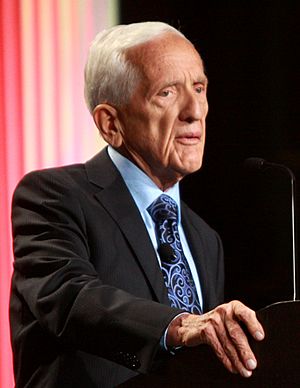T. Colin Campbell facts for kids
Quick facts for kids
T. Colin Campbell
|
|
|---|---|

Campbell speaking in 2013
|
|
| Born | March 14, 1934 |
| Education | Pennsylvania State University (BS) University of Georgia Cornell University (MS, PhD) |
| Occupation | Nutritional biochemist |
|
Notable work
|
The China Study (2005) |
| Spouse(s) | Karen Campbell |
| Children | Thomas M. Campbell, Keith E. Campbell, Nelson Campbell, Daniel I. Campbell (sons) |
Thomas Colin Campbell (born March 14, 1934) is an American biochemist, a scientist who studies the chemical processes inside living things. He is famous for his research on how the food we eat affects our health over many years. He is a professor emeritus (a retired professor who keeps his title as an honor) at the famous Cornell University.
Campbell is best known for supporting a diet based on whole foods and plants. This means eating foods like fruits, vegetables, and grains that are not heavily processed. He is the author of several popular books about nutrition, including The China Study (2005), which he wrote with his son. This book became a bestseller in America.
He was also a key scientist in a very large study called the China–Cornell–Oxford Project. This project began in 1983 to study the link between food and diseases like cancer and heart problems. The New York Times called this huge study "the Grand Prix of epidemiology" (the study of how diseases spread and can be controlled).
Contents
Early Life and Schooling
T. Colin Campbell grew up on a dairy farm. He first went to Pennsylvania State University to study to become a veterinarian. After earning his first degree in 1956, he went to Cornell University. There, he earned advanced degrees in nutrition, biochemistry, and toxicology (the study of poisons).
Career and Major Discoveries
After finishing his education, Campbell worked as a researcher at MIT and then at Virginia Tech. In 1975, he returned to Cornell University to teach and continue his research. He has advised important groups like the American Institute for Cancer Research.
The China Study
Campbell's most famous work comes from the China–Cornell–Oxford Project, often just called the China Study. This massive research project looked at the diets of 6,500 people in China. The study found that people who ate a mostly plant-based diet had a lower risk of getting serious illnesses like cancer, heart disease, and diabetes.
His research suggested a strong link between eating animal protein and the growth of cancer and heart disease. For example, in lab studies with rats, he found that he could affect the growth of cancer cells by changing the amount of casein (a protein found in milk) in their diet.
A Plant-Based Lifestyle
Since about 1990, Campbell has eaten a diet that is almost entirely vegan. However, he prefers to use the term "plant-based." He says he wants his ideas to be based on science, not just a personal belief system.
He believes people should eat whole, plant-based foods. He thinks we shouldn't rely only on vitamin pills to be healthy. Instead, we should get our nutrients from the food itself. His work became so well-known that it helped convince former U.S. President Bill Clinton to try a plant-based diet to improve his heart health.
Campbell in Movies and Media
Campbell's ideas have been featured in several documentary movies. You can see him in films like Forks Over Knives, Planeat, and Vegucated. He also appeared in PlantPure Nation, a film made by his son, Nelson Campbell. In 2024, it was announced that a movie about Campbell's life would be directed by Oscar-winner David S. Ward.
Charity Work
Campbell started the T. Colin Campbell Center for Nutrition Studies. It is a non-profit organization that teaches people about the benefits of a whole food, plant-based diet. The center works with eCornell to offer online courses about nutrition.
Awards and Recognition
Campbell has received many awards for his important work in nutrition and cancer research.
| Organizations | Year | Category | Result | |
|---|---|---|---|---|
| American College of Lifestyle Medicine | 2018 | Lifetime Achievement Award | Won | |
| American Institute for Cancer Research | 1998 | Award for Excellence in Cancer Research | Won | |
| Miami University | 2015 | James Robeson Junior Faculty Research Excellence Award | Won | |
| The Plantrician Project | 2014 | Plantrician Project Luminary Award | Won |
 | John T. Biggers |
 | Thomas Blackshear |
 | Mark Bradford |
 | Beverly Buchanan |

